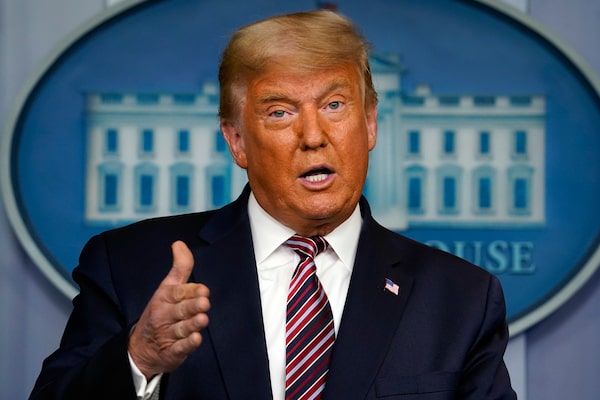
U.S. President Donald Trump speaks at the White House in Washington, on Nov. 5, 2020.Evan Vucci/The Associated Press
Americans on Wednesday faced the prospect of a government shutdown during a pandemic as outgoing President Donald Trump, angry at his fellow Republicans in Congress, demanded dramatic changes to a US$2.3-trillion government funding and coronavirus aid package.
The package, which includes US$892-billion for relief from the coronavirus crisis, passed both chambers of Congress on Monday after months of negotiations between Republicans and Democrats.
It also pays for government operations through September, 2021, so if Mr. Trump blocks it large parts of the U.S. government will start to shut down next week for lack of funds.
Mr. Trump, in a video posted to social media on Tuesday evening, surprised some of his closest officials by demanding lawmakers change the bill to include US$2,000 payments to each American, more than triple the US$600 per person provided.
A source familiar with the situation said aides thought they had talked Mr. Trump out of the US$2,000 demand last week. The video surprised even Treasury Secretary Steven Mnuchin, who took part in the talks and backed the US$600 figure.
Mr. Trump was irked when Senate Majority Leader Mitch McConnell, Congress’s top Republican, last week acknowledged Democrat Joe Biden’s defeat of Mr. Trump in the November election, another source said. Mr. Biden is due to take office on Jan. 20.
Mr. Trump did not explicitly say he would veto the measure, apparently holding out hope Congress would modify a complex package that took months to negotiate. The White House had said on Sunday that Mr. Trump would sign it into law.
Because Congress is due to adjourn at the end of the year, the bill will be automatically vetoed after 10 days if Mr. Trump takes no action, in what is known as a “pocket veto.”
Mr. Trump also demanded the bill be stripped of foreign aid, which is included in every annual federal spending bill – and was requested by his own administration last year. He objected to other government activities funded by the 5,500-page bill, such as fish breeding and funding for the Smithsonian museums.
The Democratic-controlled House of Representatives and the Republican-controlled Senate passed the bill by wide, bipartisan margins, and could return to Washington to override a veto if necessary.
Some congressional Democrats – who had viewed the relief package as too small a response to a crisis that has killed more than 320,000 Americans and thrown millions of people out of work – welcomed Mr. Trump’s move.
House Speaker Nancy Pelosi said the House could vote to raise those payments on Thursday if House Republican Leader Kevin McCarthy agreed to do so.
“Mr. President, sign the bill to keep government open! Urge McConnell and McCarthy to agree with the Democratic unanimous consent request for $2,000 direct payments! This can be done by noon on Christmas Eve!” she responded to Mr. Trump on Twitter.
Mr. McConnell and Mr. McCarthy’s offices did not immediately respond to a request for comment.
Mr. Trump’s demands put his fellow Republicans in an awkward position. Many of them opposed the US$2,000 payments that Mr. Trump is now demanding as too expensive, and they would have to either defy their party’s leader or change their position on those payments.
“Let’s get this into law, and we can have an ongoing discussion about whether there should be additional direct payments or not,” Republican Senator Pat Toomey said on Fox News.
Current federal funding is due to expire on Monday if Mr. Trump does not sign the bill into law. He is scheduled to leave for Florida on Wednesday afternoon for the Christmas holiday.
A funding lapse would furlough millions of federal workers and shut down wide swaths of the U.S. government at a time when it is rushing to distribute two coronavirus vaccines and contend with a massive hack that officials ascribe to Russia, but which Moscow denies.
Mr. Trump also vetoed a US$740-billion bill-setting policy for the Department of Defense on Wednesday, despite its strong support in Congress, raising the possibility that the measure will fail to become law for the first time in 60 years.
Mr. Trump said he vetoed the annual National Defense Authorization Act, or NDAA, because it “fails to include critical national security measures, includes provisions that fail to respect our veterans and our military’s history, and contradicts efforts by my Administration to put America first in our national security and foreign policy actions.”
“It is a ‘gift’ to China and Russia,” he said in a message to the House of Representatives.
Although his previous eight vetoes were all upheld, thanks to support from Mr. Trump’s fellow Republicans in Congress, advisers said this one looked likely to be overridden, just weeks before he leaves office on Jan. 20.
Both the Republican-controlled Senate and Democratic-majority House of Representatives passed the 2021 NDAA with margins larger than the two-thirds majorities needed to override a veto.
That means that Mr. Trump would have to persuade dozens of his fellow Republicans to throw out nearly a year’s work on the 4,500-page bill and start over.
Our Morning Update and Evening Update newsletters are written by Globe editors, giving you a concise summary of the day’s most important headlines. Sign up today.